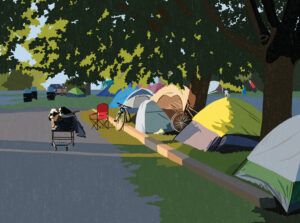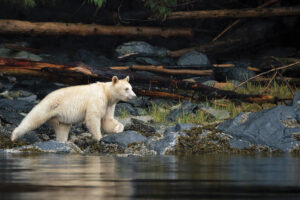
People & Culture
Kahkiihtwaam ee-pee-kiiweehtataahk: Bringing it back home again
The story of how a critically endangered Indigenous language can be saved
- 6310 words
- 26 minutes
This article is over 5 years old and may contain outdated information.
People & Culture

Ken McGoogan is the author of several books, including How the Scots Invented Canada and 50 Canadians Who Changed the World. McGoogan, who became a Fellow of The Royal Canadian Geographical Society in 2008 and served on its expeditions committee from 2008 to 2012, discusses his latest book, Celtic Lighting: How the Scots and Irish Created a Canadian Nation.
On why he wrote the book I had an ancestor who lived in the 1700s in Kintyre, Scotland. I wondered what it was like there for him, and I realized that his time is a part of my history. That led me to cultural genealogy, the idea that values and ideas can be transmitted from one generation and place to another. The figures in the book helped shape Scotland and Ireland, and their people, who brought their attitudes and beliefs to this country. Collectively, that history is part of Canadian history that we have long overlooked.
On Canada’s foundational values I broke the book down into what I call foundational values: independence, audacity, democracy, pluralism and perseverance. Then I sifted through history to determine who shaped those values in Ireland and Scotland — figures such as Michael Collins, Flora MacDonald, John Rae and John Palliser.
On his favourite personalities in the book I really enjoyed researching the history of Grace O’Malley, the Irish pirate queen. I got to sail around Ireland and Scotland, and being in the places where this audacious woman had operated really brought her to life.
On how this book is different from How the Scots Invented Canada It does more than simply add “and the Irish” to the title; I think it sets a new paradigm. The prevailing consensus seems to be that our history is here in this land only. I think our history, like our personal genealogies, crosses the ocean to encompass these people, so it’s much more extensive than we realize. That’s an idea that I don’t think has been introduced into the debate on who we are. It’s an interesting human geography story.
Are you passionate about Canadian geography?
You can support Canadian Geographic in 3 ways:

People & Culture
The story of how a critically endangered Indigenous language can be saved

People & Culture
For unhoused residents and those who help them, the pandemic was another wave in a rising tide of challenges

Wildlife
How ‘maas ol, the spirit bear, connects us to the last glacial maximum of the Pacific Northwest

Places
In Banff National Park, Alberta, as in protected areas across the country, managers find it difficult to balance the desire of people to experience wilderness with an imperative to conserve it